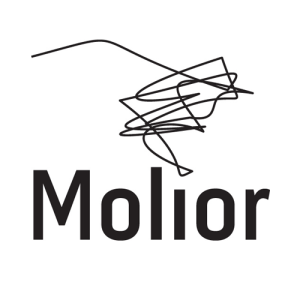Montreal, Canada
May 9th, 2024
160 Chem. du Tour de l’isle
Free
Reservation required
Molior is organizing a day of conferences and exchanges at the Biosphère | Espace pour la vie on Thursday, May 9, 2024. The event is free and open to the public. It is produced in collaboration with Espace pour la vie and Concordia University Research Chair in Critical Practices in Materials and Materiality.
Taking the transformative power of art and design as a point of departure, this one-day symposium highlights the field’s contribution to interconnected ecological and social challenges. The discussions will examine how artistic practices can reveal complex nuances of contemporary issues, imagine alternative futures, in addition to catalyzing the emergence of knowledge and know-how. Through presentations, roundtables, demos and exchanges with the public, this event will explore these topics at different scales and from a variety of angles, ranging from systemic dynamics to the individual approaches of artists and exhibition.
This event is part of a series of symposia that Molior organizes throughout the year with partners from various fields outside the arts. This approach aims to foster interdisciplinary encounters between the speakers and among the public.
The event is fully booked
Those wishing to attend are invited to join the waiting list.
Program
10:00 AM | Mobilizing Culture for the Ecological Transition (in French)
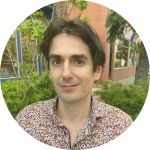 Anthony Garoufalis-Auger is a Montreal-based ecological transition campaigner. In 2021, while working at the Climate Emergency Unit, he helped found SCALE/LeSaut, a national network of individuals and organizations working at the intersection of the arts and the climate emergency. He is the co-founder of Extinction Rebellion Québec for which he was a spokesperson and he played a leading role in organizing direct actions and acts of civil disobedience. Over the past decade he has worked on various campaigns and has helped found coalitions on a broad range of topics including reducing air traffic, food system transformation, reforming the CBC/Radio-Canada, and making municipal climate plans more ambitious. He is currently working on a report on how cultural ministries could work with the cultural sector to bring about the cultural shift required to advance our urgently needed ecological transition.
Anthony Garoufalis-Auger is a Montreal-based ecological transition campaigner. In 2021, while working at the Climate Emergency Unit, he helped found SCALE/LeSaut, a national network of individuals and organizations working at the intersection of the arts and the climate emergency. He is the co-founder of Extinction Rebellion Québec for which he was a spokesperson and he played a leading role in organizing direct actions and acts of civil disobedience. Over the past decade he has worked on various campaigns and has helped found coalitions on a broad range of topics including reducing air traffic, food system transformation, reforming the CBC/Radio-Canada, and making municipal climate plans more ambitious. He is currently working on a report on how cultural ministries could work with the cultural sector to bring about the cultural shift required to advance our urgently needed ecological transition.
At last year’s international summit on climate change (COP28), national cultural ministries and civil society adopted the Emirates Declaration on CultureBased Climate Action. The declaration’s purpose was to highlight the fundamental role culture, from the arts to heritage, will play in meeting our climate objectives, and to state the signatories’ intention to work collaboratively in putting culture at the heart of climate action. In his presentation, ecological transition campaigner, Anthony Garoufalis-Auger, will explore what this might look like in practice in the Canadian and Quebec context. He will provide incomplete answers to the following questions: What would cultural policy development and our cultural infrastructure look like if they were put at the service of the urgently needed ecological transition? What are artists and cultural organizations currently doing to bring about the cultural shift needed to drive the transition and what work is left to be done?
10h30 AM | Critical Materiality and ecological imaginaries (in French)
 Dr. Alice Jarry is Associate professor of Design and Computation Arts at Concordia University. She is Research Chair in Critical Practices in Materials and Materiality, Co-Director of Hexagram – International Network dedicated to Research-Creation in Media Arts, Design, Technology and Digital Culture, and Director of the Milieux Institute Speculative Life Biolab. As an artist-researcher, she specializes in site-specific works, art-science practices and socio-environmental design. Her research brings concerns about aesthetics, and politics to bear critically upon material production and infrastructures. Focusing on residual matter and active biomaterials/composites for the built environment and the arts, Jarry examines how materiality – engaged in processes of transformation with site, technology, and communities – can provoke the emergence of resilient socio-environmental relations. Her works have been presented internationally at Centre George Pompidou, Planétarium de Montréal, Vox Centre de l’image Contemporaine, Biennale Nemo, Leonardo Da Vinci Museum of Science and Technology, Digital Arts Biennial, and Device_Art Triennale, among other locations.
Dr. Alice Jarry is Associate professor of Design and Computation Arts at Concordia University. She is Research Chair in Critical Practices in Materials and Materiality, Co-Director of Hexagram – International Network dedicated to Research-Creation in Media Arts, Design, Technology and Digital Culture, and Director of the Milieux Institute Speculative Life Biolab. As an artist-researcher, she specializes in site-specific works, art-science practices and socio-environmental design. Her research brings concerns about aesthetics, and politics to bear critically upon material production and infrastructures. Focusing on residual matter and active biomaterials/composites for the built environment and the arts, Jarry examines how materiality – engaged in processes of transformation with site, technology, and communities – can provoke the emergence of resilient socio-environmental relations. Her works have been presented internationally at Centre George Pompidou, Planétarium de Montréal, Vox Centre de l’image Contemporaine, Biennale Nemo, Leonardo Da Vinci Museum of Science and Technology, Digital Arts Biennial, and Device_Art Triennale, among other locations.
While the majority of resources extracted, transformed, consumed and discarded still struggle to find a useful second life, the multiple social and environmental implications of this linear regime underline the increasingly complex entanglements between the Technosphere and the Biosphere. How to develop more sustainable forms of interaction between technology, humans and ecological milieux? How to reconcile methods and concerns to materialize sensory and sensitive experiences of critical issues that are often invisible, distributed, and delocalized?
This presentation will address the works of the Concordia University Research Chair in Critical Practices in Materials and Materiality and its affiliated laboratory, the Milieux Institute’s Speculative Life Biolab. Through research-creation that combines material and environmental science practices, the Chair draws on the transformative potential of residual, bio-inspired and bio-composed materials to examine the socio-environmental, aesthetic and political issues associated with material and cultural production. Through various projects, this presentation will examine how this art-science platform can encourage novel social uses of research-creation, and address the affective and effective aspects of materiality to foster the emergence of novel critical imaginaries.
11:00 AM | Artistic Practices and Environments in Interaction
(in French)
Round table. Moderator: Aseman Sabet.
 Anne-Marie Belley is a curator and doctoral student in the Department of Art History at Université du Québec à Montréal. Her research explores the meanings of art in the age of industrialized biotechnology. Based on the results of studies carried out in the UQAM archives and Nunavik cooperatives to identify the 27 Inuit sculptures in the Galerie de l’UQAM Art Collection (M.A., UQAM, 2011-2013) as well as on further research with 16 contemporary art practices and 8 institutional collections that seeks to engage public space with various manifestations of life forms (De la nature, 2013; L’art est vivant I-II-III, 2016, 2017, 2018; D’après mesures, 2023), she is currently completing the design of a methodological tool (EBAM3450) that will enable her to write her thesis in a new space-time that thwarts historical linearity and reveals artistic materiality.
Anne-Marie Belley is a curator and doctoral student in the Department of Art History at Université du Québec à Montréal. Her research explores the meanings of art in the age of industrialized biotechnology. Based on the results of studies carried out in the UQAM archives and Nunavik cooperatives to identify the 27 Inuit sculptures in the Galerie de l’UQAM Art Collection (M.A., UQAM, 2011-2013) as well as on further research with 16 contemporary art practices and 8 institutional collections that seeks to engage public space with various manifestations of life forms (De la nature, 2013; L’art est vivant I-II-III, 2016, 2017, 2018; D’après mesures, 2023), she is currently completing the design of a methodological tool (EBAM3450) that will enable her to write her thesis in a new space-time that thwarts historical linearity and reveals artistic materiality.
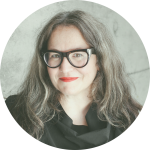 Nelly-Ève Rajotte is a professor at the School of Design of UQAM, where she heads the Moving Image and Sound Design axis. As a visual and media artist, her hybrid practice is particularly interested in moving image, sound, and immersion, through performance and installation. She is also a filmmaker, editor, and composer.
Nelly-Ève Rajotte is a professor at the School of Design of UQAM, where she heads the Moving Image and Sound Design axis. As a visual and media artist, her hybrid practice is particularly interested in moving image, sound, and immersion, through performance and installation. She is also a filmmaker, editor, and composer.
She holds a Master’s degree from the School of Visual and Media Arts at UQÀM, as well as studies in art history. In 2017, she was the President of the Jury (Digital Creation) for the Jeux de la Francophonie (Abidjan, Cote d’Ivoire). She has also been a guest professor and artist in residence at the Mel Hoppenheim School of Cinema at Concordia University in Montreal (2018-2020).
In addition to numerous exhibitions in Quebec, including at the Fonderie Darling, Parisian Laundry, Occurrence, Clark, Optica, and Circa, her works have been shown in several festivals in Canada, including MUTEK, the International Festival of Films on Art, the Mois Multi, and Espace [IM] Média, as well as internationally – International Short Film Festival of Berlin (Germany), Official Selection Transmediale (Germany), MUTEK (Argentina, Japan, and Mexico), Lab30 (Germany), Moscow International Film Festival, EXiS (Korea), Finnish Contemporary Art Fair (Finland), and ISEA2020. Her work is part of the Hydro-Québec Collection.
 A composer and sound artist, Étienne Legast’s is interested in the contextualization and relationship of sound to the environment, the way sound transforms places and the ambiance associated with them. In 2009, he co-founded the Audiotopie work cooperative, whose mission is to create site-specific works designed to raise public awareness of soundscapes and environmental issues. The whole of his work now takes place within the cooperative, where both the creation and production stages are carried out collaboratively. The site-specific approach seeks to integrate sound creation into everyday life, contaminating it all the while being contaminated by it. Many of Audiotopie’s creations bear his conceptual and musical signature.
A composer and sound artist, Étienne Legast’s is interested in the contextualization and relationship of sound to the environment, the way sound transforms places and the ambiance associated with them. In 2009, he co-founded the Audiotopie work cooperative, whose mission is to create site-specific works designed to raise public awareness of soundscapes and environmental issues. The whole of his work now takes place within the cooperative, where both the creation and production stages are carried out collaboratively. The site-specific approach seeks to integrate sound creation into everyday life, contaminating it all the while being contaminated by it. Many of Audiotopie’s creations bear his conceptual and musical signature.
This panel discussion will explore the role of curators, the practices of artist-researchers and collective approaches to highlight several artistic practices that are engaged with socio-ecological issues. More specifically, it will focus on how these practices are called into action at the intersection of different terrains, be they environmental, geological, cultural, community-based or interdisciplinary.
1:40 PM | Think Systems: Transformation Through Systemic Thinking (in English)
 Carmen Salas works as a curator and cultural producer on an international scale. She holds a BA in History of Art from Granada University (Spain), and an MA in Arts Policy and Management from Birkbeck University, London.
Carmen Salas works as a curator and cultural producer on an international scale. She holds a BA in History of Art from Granada University (Spain), and an MA in Arts Policy and Management from Birkbeck University, London.
A key part of her practice is working with artists and institutions to explore change through a lens of creative experimentation, collective reflection and debate. Exploring the capacity of the arts and culture in questioning societal systems and in bringing about change is central to her work.
After more than 15 years examining the creative and critical use of technology, and the intricacies of the internet, Carmen reoriented the focus of her work to narratives and approaches more mindful of the rapid social and environmental changes we face today. Most recently, she’s been involved in exploring the relationship between art, systems and change, as well as the need to advocate for a different value framework for the arts; one in which the key outcomes are people, relationships and the health of the planet.
Curiosity, purpose, and connecting people from different walks of life motivate her work. By creating structures for knowledge exchange, Carmen believes social innovation and personal transformation can occur more easily. Her passion lies not only in the arts, but also in all areas that reveal the reciprocal connections of the human condition such as science, philosophy, sociology.
Carmen founded Connecting the Dots, an international forum based in Mexico City focused on creativity, art, and digital culture, and has worked as creative director since 2018. Between 2017 and 2019 she curated the Paradigm Shift Forum for the Mapping Festival in Geneva. In 2009 she co-founded Alpha-ville in London, an international festival dedicated to exploring the intersection between art, technology and digital culture, which became a curatorial agency and creative studio in 2011 and developed activity on a national and international scale until 2017.
She has recently co-curated the exhibition “Sea Blindness” for NeMe Arts Centre in Limassol, Cyprus. Since 2021 she has been advising the 2026 Trenčín European Capital of Culture team on their artistic and cultural strategy. From mid 2024, she will be leading the production and implementation of two projects as part of the Trenčín European Capital of Culture program.
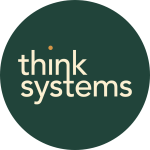
Applying Systems Thinking in the arts, and thinking of arts as a system is very powerful. It can contribute to bringing about the transformation needed to address the interconnected challenges we currently face as society.
For this talk, curator and cultural producer Carmen Salas will use a range of creative tools, including an interactive 3D visualization and a group exercise to guide the audience through an exploratory journey that will illustrate what the process of developing Think Systems resulted in, and what it’s like to think systematically.
She will demonstrate the potential of Systems Thinking through an exploration of how this approach has shaped the work of influential creatives and thinkers linked to the project, such as Buckminster Fuller and Cassie Robinson. As part of this talk, she will also provide details about Think Systems’ origins and objectives, and describe how it was an outcome of her own transformative process.
2:40 PM | Think Systems: Unfolding Collective Reflections on Art and Systems Thinking (in English)
Round table. Moderator: Jana Awad.
 Dr. Alice Jarry is Associate professor of Design and Computation Arts at Concordia University. She is Research Chair in Critical Practices in Materials and Materiality, Co-Director of Hexagram – International Network dedicated to Research-Creation in Media Arts, Design, Technology and Digital Culture, and Director of the Milieux Institute Speculative Life Biolab. As an artist-researcher, she specializes in site-specific works, art-science practices and socio-environmental design. Her research brings concerns about aesthetics, and politics to bear critically upon material production and infrastructures. Focusing on residual matter and active biomaterials/composites for the built environment and the arts, Jarry examines how materiality – engaged in processes of transformation with site, technology, and communities – can provoke the emergence of resilient socio-environmental relations. Her works have been presented internationally at Centre George Pompidou, Planétarium de Montréal, Vox Centre de l’image Contemporaine, Biennale Nemo, Leonardo Da Vinci Museum of Science and Technology, Digital Arts Biennial, and Device_Art Triennale, among other locations.
Dr. Alice Jarry is Associate professor of Design and Computation Arts at Concordia University. She is Research Chair in Critical Practices in Materials and Materiality, Co-Director of Hexagram – International Network dedicated to Research-Creation in Media Arts, Design, Technology and Digital Culture, and Director of the Milieux Institute Speculative Life Biolab. As an artist-researcher, she specializes in site-specific works, art-science practices and socio-environmental design. Her research brings concerns about aesthetics, and politics to bear critically upon material production and infrastructures. Focusing on residual matter and active biomaterials/composites for the built environment and the arts, Jarry examines how materiality – engaged in processes of transformation with site, technology, and communities – can provoke the emergence of resilient socio-environmental relations. Her works have been presented internationally at Centre George Pompidou, Planétarium de Montréal, Vox Centre de l’image Contemporaine, Biennale Nemo, Leonardo Da Vinci Museum of Science and Technology, Digital Arts Biennial, and Device_Art Triennale, among other locations.
 Since 2016, Aurélie Besson has been the Executive and Artistic Director of Molior. She has developed collaborative projects in China, Brazil, Mexico, France, Slovakia, Czech Republic, Hungary, Poland, Switzerland and Canada. For more than 15 years, she has directed interdisciplinary projects in art, science and technology, alternately as a researcher, curator, artistic director or manager.
Since 2016, Aurélie Besson has been the Executive and Artistic Director of Molior. She has developed collaborative projects in China, Brazil, Mexico, France, Slovakia, Czech Republic, Hungary, Poland, Switzerland and Canada. For more than 15 years, she has directed interdisciplinary projects in art, science and technology, alternately as a researcher, curator, artistic director or manager.
In 2023, she obtained a PhD in Study and practice of the arts at the Université du Québec à Montréal, co-supervised by Louise Poissant and Victor Frak. Her research has been developed according to a transdisciplinary approach in which she explores the concepts of enaction and the kinaesthetic senses in the experience of practicable works. She has organized a dozen conferences and has been involved in several research groups with Montreal universities. She also coordinated the production of the book Lumières de la ville (PUQ), edited by Louise Poissant, and has published several articles on the digital arts in books, blogs and magazines. Aurélie is regularly invited to conferences and sits on numerous committees and juries that recognize her expertise.
Between 2007 and 2010, she directed European collaborative art and technology projects and events in Prague. She holds a MA degree in communication (Université de Lyon 2; Universiteit Utrecht) and a MA degree in cultural development and project management (Université de Lyon 2). She teaches a course on Arts and technologies: foundations and challenges at Université de Sherbrooke.
 Carmen Salas works as a curator and cultural producer on an international scale. She holds a BA in History of Art from Granada University (Spain), and an MA in Arts Policy and Management from Birkbeck University, London.
Carmen Salas works as a curator and cultural producer on an international scale. She holds a BA in History of Art from Granada University (Spain), and an MA in Arts Policy and Management from Birkbeck University, London.
A key part of her practice is working with artists and institutions to explore change through a lens of creative experimentation, collective reflection and debate. Exploring the capacity of the arts and culture in questioning societal systems and in bringing about change is central to her work.
After more than 15 years examining the creative and critical use of technology, and the intricacies of the internet, Carmen reoriented the focus of her work to narratives and approaches more mindful of the rapid social and environmental changes we face today. Most recently, she’s been involved in exploring the relationship between art, systems and change, as well as the need to advocate for a different value framework for the arts; one in which the key outcomes are people, relationships and the health of the planet.
Curiosity, purpose, and connecting people from different walks of life motivate her work. By creating structures for knowledge exchange, Carmen believes social innovation and personal transformation can occur more easily. Her passion lies not only in the arts, but also in all areas that reveal the reciprocal connections of the human condition such as science, philosophy, sociology.
Carmen founded Connecting the Dots, an international forum based in Mexico City focused on creativity, art, and digital culture, and has worked as creative director since 2018. Between 2017 and 2019 she curated the Paradigm Shift Forum for the Mapping Festival in Geneva. In 2009 she co-founded Alpha-ville in London, an international festival dedicated to exploring the intersection between art, technology and digital culture, which became a curatorial agency and creative studio in 2011 and developed activity on a national and international scale until 2017.
She has recently co-curated the exhibition “Sea Blindness” for NeMe Arts Centre in Limassol, Cyprus. Since 2021 she has been advising the 2026 Trenčín European Capital of Culture team on their artistic and cultural strategy. From mid 2024, she will be leading the production and implementation of two projects as part of the Trenčín European Capital of Culture program.

This panel is an opportunity for workshop participants to share their highlights and takeaways from the online sessions that took place in April and May 2024. Additionally, it provides a chance to further the collective reflective process. After hearing what resonated with the panel members, we’ll open the floor for questions and invite the audience to take part in the exchanges.
4:20 PM | Presentations and demos: research on critical materiality (bilingual)
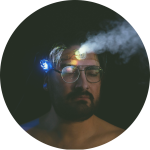 Cristo Riffo is a Chilean artist who explores the ideas behind memory, light, politics and biology through the creation of live performances and kinetic installations, hacking technological devices through the usage of microbiology, electronics, robotics and chemistry.
Cristo Riffo is a Chilean artist who explores the ideas behind memory, light, politics and biology through the creation of live performances and kinetic installations, hacking technological devices through the usage of microbiology, electronics, robotics and chemistry.
He completed a Bachelor in Arts from the University of Playa Ancha (CL). Cristo has participated in several group exhibitions in Chile and the rest of the world such as Bahia, Buenos Aires, Bogotá and Berlin.
He has received support from the Chilean National Fund for the Arts (FONDART) for the design and creation of his exhibition Arqueologia de la Luz in 2019. In 2023 he won the Research and Exploration fund from CALQ, alongside Artist Diego B.C with the project Dimensions. In the same year he presented his work at the Theme Exhibition of Ars Electronica -Who Owns the Truth?- with his piece Sistema Cinco: Non Human Determinations.
Currently he’s finishing an MFA at Intermedia in Concordia University.
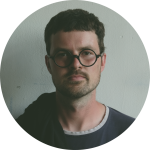 Philippe Vandal is a new media artist based in Montreal. At the intersection of technological, ecological, and artistic preoccupations, Philippe’s work bridges bio-inspired critical design, environmental chemistry, and site-specific tangible media interventions. Philippe has a Bachelor of Fine Arts in Intermedia Cyber Arts at Concordia University and is currently doing a Masters of Arts in Individualized Program titled Spectral Narratives: Art-Science Objects Unveiling Scientific Protocols for Detecting Petroleum Hydrocarbons in Urban Soils in Montreal. He is a student member of Concordia University’s Milieux Institute, the Research Chair in Critical Practices in Materials and Materiality, and Hexagram. He is also part of the Speculative Life’s Cluster at Concordia’s Milieux, for which he has been nominated an Undergraduate Fellow for 2020-2021. His work has been featured in the Champ des possibles (2022), at Milieux (2023), Concordia’s VAV Gallery (2019), Art Mûr (2019), Eastern Bloc (2017, 2022), during the International Symposium on Electronic Arts (ISEA2020:What is Sentience?). He has also collaborated for an exhibition at EISODE in Montreal (2024), the Pompidou Centre in Paris (2021), Ars Electronica in Linz (2021), and Montreal’s Rio Tinto Alcan Planetarium (2022). Philippe is a member of mesocosm, an audiovisual experiment with sound artist Joel Lavoie and visual artist Emma Forgues, which presented at Mutek Montréal (2021), Currents New Media in Santa Fe, California (2022), Elektra (2023), and forthcoming at the SAT and Mutek (2024).
Philippe Vandal is a new media artist based in Montreal. At the intersection of technological, ecological, and artistic preoccupations, Philippe’s work bridges bio-inspired critical design, environmental chemistry, and site-specific tangible media interventions. Philippe has a Bachelor of Fine Arts in Intermedia Cyber Arts at Concordia University and is currently doing a Masters of Arts in Individualized Program titled Spectral Narratives: Art-Science Objects Unveiling Scientific Protocols for Detecting Petroleum Hydrocarbons in Urban Soils in Montreal. He is a student member of Concordia University’s Milieux Institute, the Research Chair in Critical Practices in Materials and Materiality, and Hexagram. He is also part of the Speculative Life’s Cluster at Concordia’s Milieux, for which he has been nominated an Undergraduate Fellow for 2020-2021. His work has been featured in the Champ des possibles (2022), at Milieux (2023), Concordia’s VAV Gallery (2019), Art Mûr (2019), Eastern Bloc (2017, 2022), during the International Symposium on Electronic Arts (ISEA2020:What is Sentience?). He has also collaborated for an exhibition at EISODE in Montreal (2024), the Pompidou Centre in Paris (2021), Ars Electronica in Linz (2021), and Montreal’s Rio Tinto Alcan Planetarium (2022). Philippe is a member of mesocosm, an audiovisual experiment with sound artist Joel Lavoie and visual artist Emma Forgues, which presented at Mutek Montréal (2021), Currents New Media in Santa Fe, California (2022), Elektra (2023), and forthcoming at the SAT and Mutek (2024).
Students from Concordia University Research Chair in Critical Practices in Materials and Materiality and the Speculative Life Biolab of the Milieux Institute will share their research-creation work with the public, presenting devices and artifacts, posters and documentation.
The public will be invited to meet and chat with them over a drink.

Molior thanks the Bureau du Québec à Barcelone for its support.
